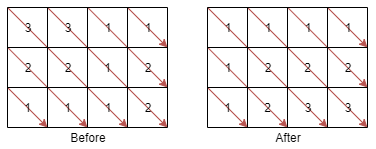Given a m * n matrix mat of integers, sort it diagonally in ascending order from the top-left to the bottom-right then return the sorted array.
Input: mat = [[3,3,1,1],[2,2,1,2],[1,1,1,2]] Output: [[1,1,1,1],[1,2,2,2],[1,2,3,3]]
m == mat.lengthn == mat[i].length1 <= m, n <= 1001 <= mat[i][j] <= 100
# @param {Integer[][]} mat
# @return {Integer[][]}
def diagonal_sort(mat)
m, n = mat.length, mat[0].length
for i in 0...(m + n)
row = [m - 1 - i, 0].max
col = [i - m + 1, 0].max
arr = []
for j in 0...[m - row, n - col].min
arr.push(mat[row + j][col + j])
end
arr.sort!
for j in 0...[m - row, n - col].min
mat[row + j][col + j] = arr[j]
end
end
return mat
endimpl Solution {
pub fn diagonal_sort(mat: Vec<Vec<i32>>) -> Vec<Vec<i32>> {
let m = mat.len();
let n = mat[0].len();
let mut ret = vec![vec![0; n]; m];
for i in 0..(m + n) {
let mut row = (m - 1).saturating_sub(i);
let mut col = i.saturating_sub(m - 1);
let mut arr = vec![];
for j in 0..(m - row).min(n - col) {
arr.push(mat[row + j][col + j]);
}
arr.sort_unstable();
for j in 0..(m - row).min(n - col) {
ret[row + j][col + j] = arr[j];
}
}
ret
}
}